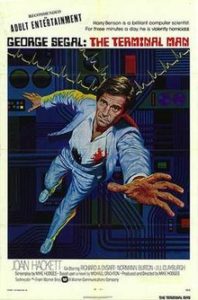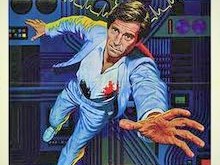The Terminal Man **** (1974, George Segal, Joan Hackett, Richard Dysart, Jill Clayburgh) – Classic Movie Review 8645
Writer-director Mike Hodges’s fascinating 1974 Sci-Fi horror thriller The Terminal Man is based on the 1972 novel by Michael Crichton and stars George Segal as brainy computer scientist Harry Benson, who suffers from epilepsy and has a psycho-surgical procedure known as Stage Three, in which surgeons to implant electrodes in his brain to detect the onset of a seizure and use an electrical impulse to stop it.
Joan Hackett also stars as Benson’s psychiatrist Dr Janet Ross, with Richard A Dysart as Dr John Ellis, Jill Clayburgh as Angela Black, Donald Moffat as Dr Arthur McPherson, Michael C Gwynne as Dr Robert Morris, William Hansen as Dr Ezra Manon, Norman Burton as Detective Captain Anders and James B Sikking as Ralph Friedman.
The story about the dangers of mind control and the power of computers was visionary back in 1972 and remains relevant.
Crichton was hired to adapt his novel, but Warner Bros thought his screenplay had departed from his source material too much and took on another writer. ‘I don’t think they gave it a chance,’ said Crichton.
After its poor reception on release in the US on 19 June 1974, Warner Bros decided not to release the film in UK cinemas. Mike Hodges says: ‘I think people had a problem accepting George Segal in the lead role. I liked the fact that it was unusual casting. He is terribly good in it and, now that his career is not too top heavy with comedy, you can see him purely as an actor – and a good one.’
Hodges recalls: ‘The American painter Edward Hopper was relatively unknown here in those days. Something made me pick up a book of his paintings in Pickwick’s bookshop on Hollywood Boulevard. I opened it and there was my film. There was the loneliness of urban America on every page. I can remember snipping my film down to match the loneliness that Hopper had captured.’ Warner Bros refused to let Hodges shoot in black and white.
Hodges edited the director’s cut shown at the Edinburgh International Film Festival on 2 August 2003 by removing Warner Bros’ self-contained opening expository scene of the doctor looking at photographs of Harry Benson.
© Derek Winnert 2019 Classic Movie Review 8645
Check out more reviews on http://derekwinnert.com



